Private Eye Surgery
Specialised private eye surgery in Devon
Welcome to the ZEISS Cataract Suite, a leading-edge facility in the UK dedicated exclusively to cataract care. Our commitment to utilising the latest technology allows our expert surgeons to perform intraocular lens (IOL) implantation with remarkable efficiency and precision.
In addition to cataract treatment, The Medical Eye Clinic offers a broad range of services for various eye conditions, such as glaucoma and age-related macular degeneration. From your first consultation through to the completion of your procedure, we prioritise your care and strive to deliver exceptional service at every stage.
The Medical Eye Clinic Offers Expert Private Eye Surgery
At The Medical Eye Clinic Exeter, we recognise how crucial clear vision is to overall health and happiness. Our commitment to eye care stems from a deep appreciation for the beauty and vibrancy that surrounds us, which can often be taken for granted. We fully understand the challenges that come with visual impairments and the impact they can have on daily life.
Located in the heart of Devon, our clinic is proud to feature a team of skilled professionals, including experienced ophthalmologists and optometrists. In collaboration with Bill Opticians, a respected name in the Southwest, we strive to provide top-notch eye care services. Whether you require expert treatments, thorough eye exams, contact lenses, or stylish new glasses, our dedicated staff is here to assist you with care and professionalism.
What makes us unique is our holistic approach to eye health, bringing a variety of specialists together in one convenient location. This setup allows us to offer a smooth and comprehensive experience for our patients, with a strong emphasis on individualised care and outstanding results. Using advanced technology and diagnostic tools, we ensure that each eye examination is detailed and accurate, with treatments specifically designed to meet your unique needs.
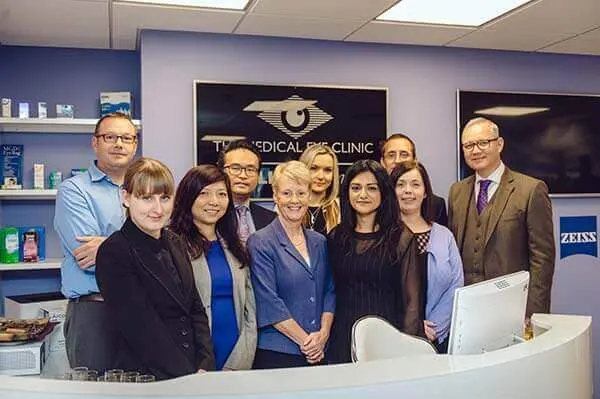
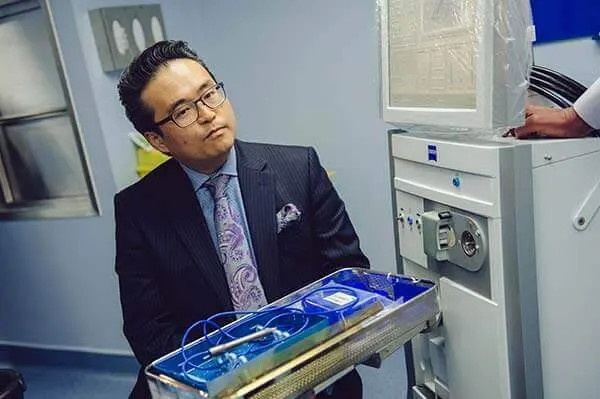
Our Eye Surgeries at The Medical Eye Clinic Exeter
Welcome to our advanced ZEISS Cataract Suite, where we focus on effectively treating and removing cataracts. Our experienced surgeons utilise the latest technology to expertly and precisely implant intraocular lenses (IOL).
Beyond cataract surgery, we are also equipped to manage a range of other eye conditions, including glaucoma and age-related macular degeneration. From your initial consultation through to the successful outcome of your procedure, we are committed to delivering an exceptional level of care that prioritises your needs and ensures a comprehensive experience.
- Cataracts
- Diabetic Macular Oedema
- Glaucoma
- Wet Macular Degeneration
- Refractive Errors
Cataracts eye surgery
What are cataracts?
Private cataract surgery has become a popular and effective option for those suffering from the challenges posed by cataracts. This eye condition, characterised by a clouding of the lens, can significantly hinder vision. In Devon, many patients are choosing to undergo private cataract surgery because of its numerous advantages.
Cataracts are a common eye disorder that leads to a loss of clarity in vision as the lens becomes increasingly opaque. Normally, the lens is clear and allows for precise sight, but cataracts disrupt this clarity. Over time, the cloudy areas can spread, potentially resulting in severe vision loss.
While cataracts typically affect both eyes, they can also develop in just one eye or be more pronounced in one over the other. The main factor behind cataracts is the ageing of lens tissues, which leads to the formation of protein clumps that block light from passing through properly.
Cataract treatment
Currently, there are no known medical advancements that can effectively delay or prevent the progression of cataracts. However, there is a practical solution available for those seeking improvement: the replacement of the natural, cloudy lens with an artificial intraocular lens.
Opting for this procedure not only offers individuals a significant enhancement in their vision, but it can also greatly improve their overall quality of life. Cataract private eye surgery is widely recognised as one of the most commonly performed, safest, and most successful surgical interventions worldwide.
During the surgery, highly skilled professionals delicately remove the cloudy natural lens and create a small incision at the edge of the eye to facilitate the placement of the artificial intraocular lens. Interestingly, this incision typically heals on its own, eliminating the need for stitches and allowing for a rapid and hassle-free recovery. The entire procedure generally lasts between 15 and 30 minutes, and with the administration of anaesthesia, patients experience a completely pain-free process.
Diabetic macular eye surgery
What is diabetic macular?
The retina acts as a crucial layer at the back of the eye, essential for our vision. Within this complex arrangement of cells, we find the foundation of our ability to see. A particularly significant part of the retina is the macula, which is responsible for our perception of vivid colours and fine details. Unfortunately, diabetes can disrupt the fragile blood vessels in this area, leading to serious complications.
As these small capillaries weaken, they start to leak fluid and proteins, resulting in swelling and excess moisture in the macula. This condition is known as diabetic macular oedema (DMO), and it can severely impact vision.
What treatments are available for DMO?
As DMO is effectively the manifestation of diabetes in the eye, the treatment for DMO includes optimising the following system risk factors:
- Improve the control of diabetes
- Improve the control of blood pressure
- Improve the control of ‘lipid profile.’
In addition to these systemic measures, the following ‘eye-specific’ treatments can be used to treat DMO:
Laser treatment. This is the conventional treatment for DMO, useful for treating DMO that does not directly involve the central vision. However, when DMO is very close to or involves the very centre of the macula, laser treatment can have the undesirable effect of producing scarring in the central vision.
Pharmacological treatment by intravitreal therapy This is when medication is injected into the main eye cavity, the vitreous, to treat DMO. This is the modern treatment that is preferable in most cases of DMO, especially when DMO is very close to or involves the central vision.
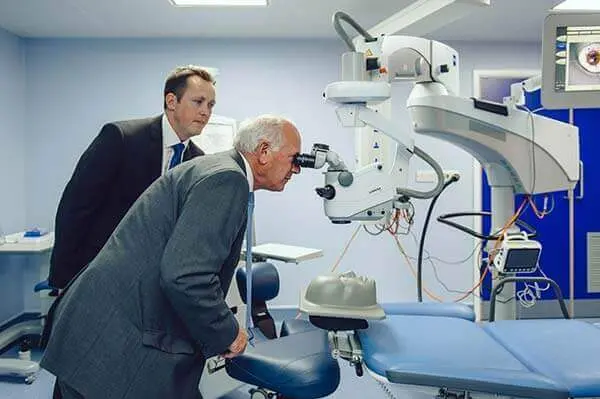
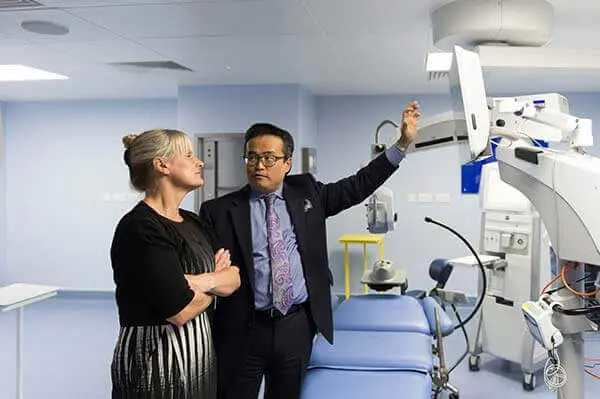

Glaucoma eye surgery
What is glaucoma?
Glaucoma refers to a collection of eye disorders that lead to increased pressure within the eye, which can ultimately harm the optic nerve and cause gradual peripheral vision loss. Treatment options for glaucoma depend on the specific type of the condition. One of the most troubling aspects of glaucoma is its insidious nature; often, there are no obvious symptoms like pain or noticeable changes in vision.
Unfortunately, this can lead to individuals being unaware of the problem until they experience significant and irreversible loss of peripheral sight. The Medical Eye Clinic is a reputable establishment, featuring a dedicated team of ophthalmologists and optometrists who specialise in delivering thorough glaucoma care.
Glaucoma Treatment
Managing glaucoma requires a lifelong dedication, involving consistent check-ups and ongoing treatment. At our highly respected Medical Eye Clinic in Exeter, we offer a wide range of specialised treatments carefully designed to effectively reduce intraocular pressure (IOP), the primary method for managing this condition. Our devoted glaucoma consultant will collaborate closely with you, tailoring a personalised treatment plan that caters specifically to your individual requirements.
Glaucoma Eye Drops
Historically, glaucoma eye drops have served as the mainstay of treatment, delivering impressive outcomes. Consistency is key in their application, often necessitating a daily regimen. Nevertheless, some individuals may find the daily ritual of instilling eye drops unsettling, and certain medical conditions may render them unsuitable for glaucoma care.
Fortunately, the Medical Eye Clinic provides patients with a range of alternative treatments in conjunction with drops, guaranteeing comprehensive and tailored care.
LASER TREATMENT: Selective Laser Trabeculoplasty, or SLT
SLT provides an effective and straightforward solution for lowering intraocular pressure, making it a suitable option for many individuals dealing with glaucoma. This procedure employs advanced laser technology to enhance the eye’s drainage system, leading to a notable reduction in pressure. To ensure comfort, a few drops of anaesthetic are applied before the treatment begins. It’s advisable to avoid driving right after the procedure, but most people can usually get back behind the wheel the next day.
Some patients may experience a temporary sensitivity to light for about a week, and in more severe cases, anti-inflammatory drops might be recommended to help with this issue. It’s also important to note that around 3% of patients may see a short-lived spike in eye pressure right after the treatment, but this generally resolves quickly. SLT has shown success in about 80% of glaucoma cases. While it may take a little time to see the full effects, many patients enjoy stable intraocular pressure for several years afterwards, reducing the need for ongoing eyedrop use.
We will schedule regular follow-up appointments to track your progress using state-of-the-art tools like OCT scans, visual field tests, and intraocular pressure measurements. If needed, the treatment can be repeated to ensure the best possible outcome. Remember, optometrists frequently catch the early signs of glaucoma during standard eye exams. We invite you to contact our Exeter eye clinic to book your routine eye check-up and discuss any questions or concerns you may have.
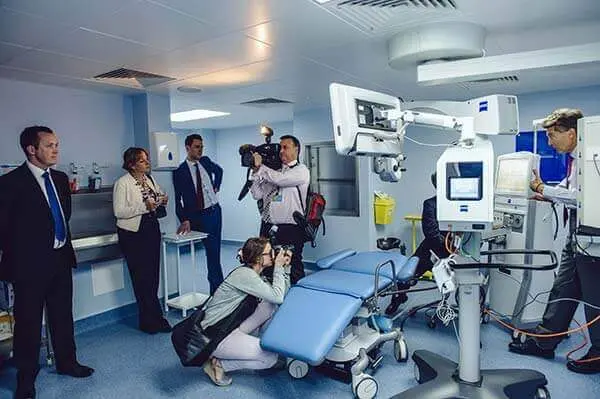
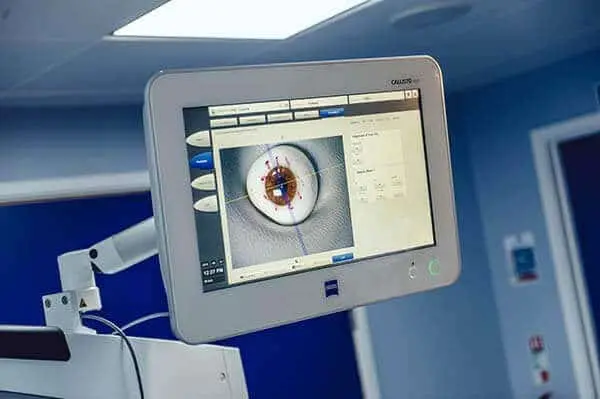
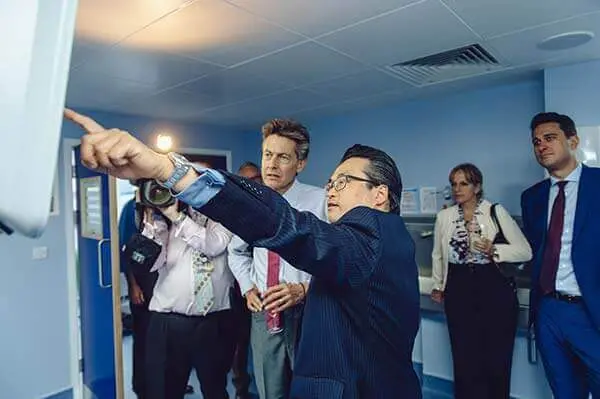
Wet macular degeneration
What is the Macula?
The retina functions as a fragile layer, similar to a sensitive film, gently enveloping the back of the eye. Inside this complex framework, a multitude of specialised cells work together seamlessly to enable sight. Particularly noteworthy, the macula, a profoundly important area situated within the retina, assumes the crucial role of perceiving vivid colours and intricate intricacies, allowing us to genuinely savour the beauty of our surroundings.
What Treatment is Available?
The development of an unusual network of blood vessels heavily depends on a signalling molecule known as Vascular Endothelial Growth Factor (VEGF). This molecule is responsible for the persistent growth and leakage of these vessels. To address this issue, scientists have created specialised humanised antibodies called anti-VEGF agents.
These agents are specifically designed to target VEGF and hinder its impact on the abnormal blood vessel network in individuals suffering from wet age-related macular degeneration (AMD). Consequently, the vessels stop leaking and expanding, effectively halting the progression of wet AMD. In order to treat wet macular degeneration, a technique called intravitreal therapy (IVT) is employed.
This therapy involves the repeated administration of anti-VEGF agents through injections into the vitreous cavity, which is the primary hollow space located at the back of the eye. The main purpose of this process is to dry out the macula, a critical area affected by wet AMD, and mitigate its detrimental effects.
Refractive Errors Eye Surgery
What are refractive errors?
In individuals with a refractive error, the optics of the eye (the cornea and lens) cannot focus light from distant objects on the retina.
Common refractive errors include:
Myopia: When the optics of the eye are too powerful for the length of the eyeball, one has myopia, or nearsightedness.
Hyperopia: When the optics of the eye are not powerful enough for the length of the eyeball, one has hyperopia, or farsightedness.
Astigmatism: when the optics of the eye are too powerful or too weak across one meridian. A person with astigmatism sees the lines of a particular orientation less clearly.
Presbyopia: when the flexibility of the lens declines due to age, leading to difficulty in near vision.
What is Refractive Lens Exchange Surgery?
Refractive Lens Exchange (RLE) surgery is a remarkable surgical technique aimed at resolving lens-related problems by removing the natural lens and replacing it with a carefully designed artificial lens implant.
This cutting-edge implant is custom-made to correct specific refractive errors, resulting in exceptional visual clarity at your desired distance(s) and effortlessly adapting to your lifestyle needs.
Am I suitable for refractive lens exchange surgery?
Between the ages of 45 and 55, many people may notice a decline in their ability to focus on objects at various distances due to changes in the crystalline lens. When this happens, one option to consider is refractive lens exchange surgery. This procedure can be particularly beneficial for those who already have significant refractive errors such as myopia, hyperopia, or astigmatism.
Refractive lens exchange surgery has the power to greatly improve their quality of life by reducing or even eliminating the need for glasses or contact lenses. With this procedure, individuals can enjoy a lifestyle that is no longer burdened by the reliance on visual aids.

Benefits of private eye surgery in Devon
Enhanced Treatment Availability
Private healthcare facilities provide a significant benefit in comparison to the extended waiting times commonly experienced in the National Health Service (NHS). Patients often have to endure lengthy periods of six months or more before their crucial surgical procedures can be scheduled within the NHS.
On the contrary, our reputable private eye surgery centre, situated in Devon, guarantees swift and effective treatment, usually within a few weeks after the initial consultation. This guarantees patients timely and indispensable care, eliminating any unnecessary delays.
The Significance of Prompt Treatment Access
The importance of having immediate access to private eye surgery cannot be overstated, and there are several compelling reasons for this. Firstly, receiving treatment without delay significantly shortens the waiting period, which is vital since long waits can exacerbate a patient’s deteriorating vision, ultimately affecting their quality of life. Everyday activities such as reading, driving, and recognising loved ones can become increasingly difficult and frustrating.
This can lead to a growing reliance on others and a feeling of lost independence. Additionally, ignoring eye issues can result in more serious complications, such as chronic inflammation, glaucoma, or even total vision loss in extreme situations. Therefore, the sooner patients can get treatment, the less likely they are to face these complications, and the faster they can regain their normal vision.
Furthermore, quick access to care helps alleviate the stress and anxiety that often accompany waiting for medical procedures, which can significantly enhance a person’s mental well-being.
To embark on your journey towards private eye surgery in Devon, we highly encourage you to reach out to our dedicated team today. You have the option to either call our team at 01392 829436 or use our convenient online contact form.
